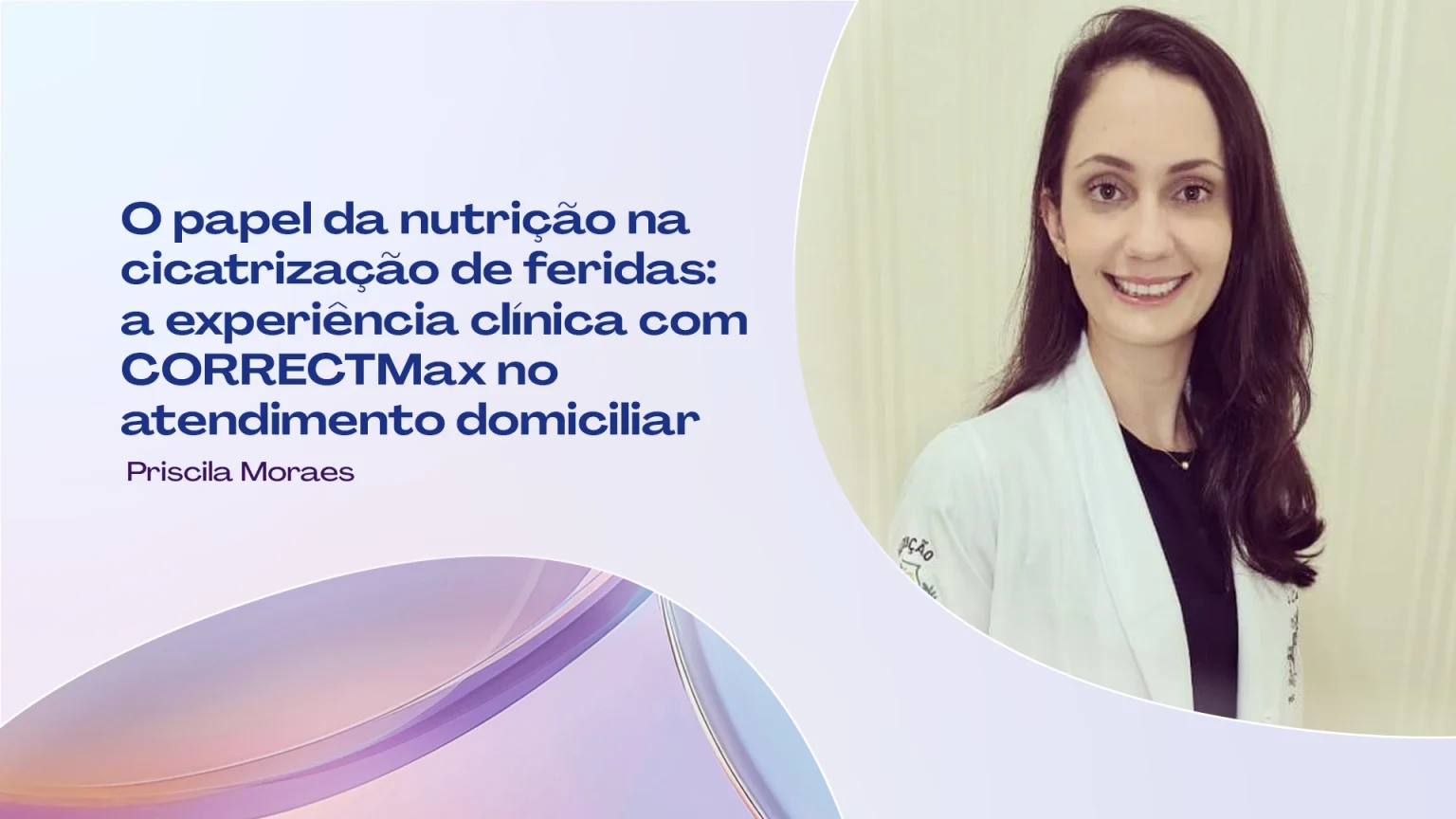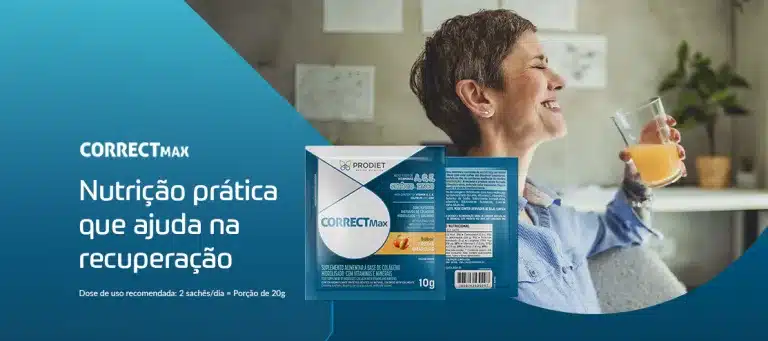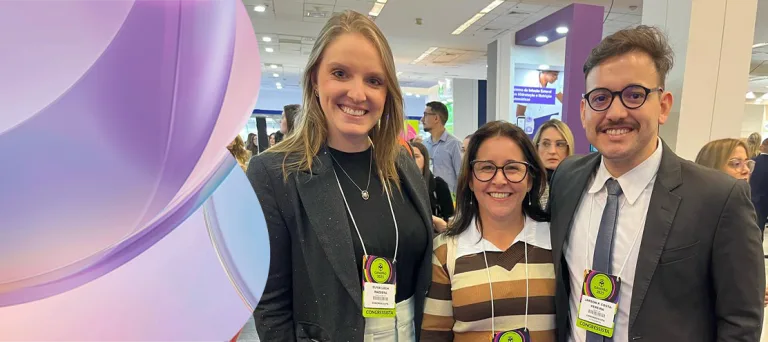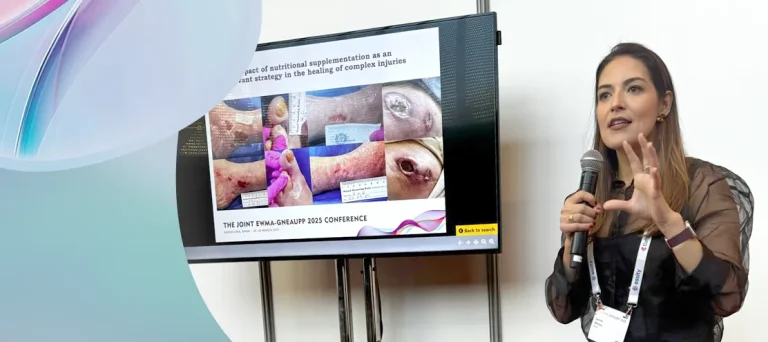In home care, nutrition plays a fundamental role in the recovery of patients with wounds, directly influencing the healing process. To better understand the challenges and nutritional strategies used in clinical practice, we spoke to nutritionist Priscila Moraes, who shares her experience in monitoring these patients and the results observed throughout treatment.
Want to listen to the full interview? Play below and follow the full interview with nutritionist Priscila directly on Prodiet Science's Spotify!
Check out the interview and learn more about the importance of nutrition in wound healing!
1. In home care, how does the nutritionist work with patients with wounds? What types of wounds do you come across most often?
In home care, the nutritionist plays an essential role, but is often only called in when the wound hasn't progressed well for some time. In the beginning, not all patients with wounds were referred to me, but that changed because the team realized that nutrition makes a difference to healing. Today, whenever there is a patient with a wound, they call me because they know that adequate nutritional support greatly speeds up recovery.
The most common wounds are pressure ulcers, especially in bedridden patients, and chronic lesions in diabetics. I also treat many cases of post-surgical wounds, especially when healing is not progressing as it should. In all these cases, nutrition plays a decisive role in the outcome of the treatment.
2. How does the work of the nutritionist fit into the multidisciplinary care of these patients? How does nutrition contribute to wound recovery?
The nutritionist's work goes hand in hand with that of the nursing and medical staff. When a patient has a wound, they need complete care, which involves both dressings and proper nutrition. If any essential nutrient is missing, healing can be slower, and in some cases the wound can even become chronic.
I've seen patients who had dressings without following all the proper precautions, but who nevertheless made a good recovery because they had the right nutritional support. This makes it clear that nutrition has a real impact on tissue regeneration. If the body doesn't have the right nutrients, it simply can't close the wound as it should.
3. What aspects are considered in the nutritional assessment of a patient with wounds? How do you monitor the progress of treatment and assess the impact of nutrition on healing?
In the nutritional assessment, I consider the patient's dietary history, general nutritional status and, above all, any deficits that may interfere with healing. Many patients even eat adequate amounts, but the quality of the food is insufficient. I see many cases where the protein intake is not sufficient or the diet is deficient in essential micronutrients such as selenium, zinc and vitamins A, E and C. This has a direct impact on recovery time. This has a direct impact on the recovery time of the wound.
We monitor the progress of the injury closely over the weeks. When we can ensure that the patient is receiving the right nutrients, the healing process speeds up, and the difference in recovery is evident.
4. In your clinical practice, what are the most common challenges in the nutritional management of patients with wounds? Are there any factors that can hinder or delay healing?
One of the main challenges is to ensure that the patient actually receives all the nutrients necessary for healing. Low food intake can be a problem, especially in debilitated patients or those who have been hospitalized for long periods. However, even when we manage to adjust calorie and protein intake, this doesn't necessarily mean that the food is of good nutritional quality.
Many patients consume adequate amounts of food, but their diet is based on foods that are poor in micronutrients that are essential for tissue regeneration. This is a critical point because, in order for healing to take place efficiently, it's not enough just to meet the protein recommendation; the body needs specific signals that stimulate and sustain this process. Zinc, selenium, vitamins A, C and E are examples of fundamental micronutrients, but they are difficult to reach optimal levels with conventional food alone, especially as demand is increased at this stage.
Furthermore, adherence to nutritional treatment can be an obstacle. Some patients don't follow the guidelines out of resistance or because they don't understand the importance of nutrition in healing. In addition, clinical conditions such as decompensated diabetes and persistent inflammatory processes can further delay tissue regeneration, making nutritional intervention an even more decisive factor for a positive outcome.
5. What nutritional strategies do you consider essential to optimize wound healing? Which nutrients play a key role in this process?
The main strategy is to improve the quality of the diet, ensuring an adequate supply of proteins and micronutrients that are essential for tissue regeneration. Bioactive collagen peptides are an excellent resource because they are well absorbed and help in the formation of new tissue. L-arginine also plays an essential role, as it improves circulation and makes it easier for oxygen and nutrients to reach the wound.
In addition, zinc, selenium and vitamins A, C and E are indispensable for the healing process, as they act to regenerate cells and strengthen the immune response. As these nutrients are not always present in the patient's diet in sufficient quantities, supplementation becomes a very effective strategy.
6. In which situations does nutritional supplementation become indispensable for the treatment of chronic wounds? How does it fit into your clinical approach?
Supplementation becomes essential when the patient has a large wound and food alone cannot meet the increased need for nutrients. This happens a lot with patients who have recently been discharged from hospital, who are still eating very little, or with those who have had an unhealed wound for a long time.
In my practice, I usually introduce supplementation whenever I see that the diet isn't enough. In more serious cases, supplementation is introduced right from the start to ensure that the wound doesn't take so long to close. In addition, I always opt for formulas that are well accepted, because there's no point in prescribing something that the patient won't be able to take for a long time.
7. What are the most common difficulties in ensuring patient adherence to supplementation? How do you try to overcome these challenges to ensure more effective follow-up?
The first challenge is the taste. Many traditional supplements are difficult to take and patients end up getting sick of them. I've seen cases where, after a few weeks, they simply couldn't take it anymore. There's also the issue of forgetfulness, which happens a lot, especially with elderly patients.
What really helps with adherence is when the supplement has a pleasant taste and a practical presentation. Supplements in sachets, for example, are easier to consume and allow dose adjustments without impacting on the diet. I've had patients taking supplements for months without complaint, and that makes all the difference to the success of the treatment.
8. In your experience, how can adequate nutritional support influence healing time and the risk of complications? Do you notice significant differences between patients who receive this support and those who don't?
Yes, the difference is enormous. I've had patients with very large wounds that, without nutritional support, took around six months to heal, and that's when they didn't chronify and close. With adequate supplementation, wounds of the same size were able to heal.
close in two to three months. This is a huge gain, both for the patient and for the team and family.
In addition to healing time, supplementation reduces the risk of complications such as infections and persistent pain. When nutritional support is well adjusted, the patient recovers faster, has fewer functional limitations and returns to their routine much sooner than expected.
9. For other professionals who deal with patients with wounds, what recommendations would you give to enhance nutritional recovery in these cases?
I would say don't underestimate the impact of nutrition on wound care. Sometimes we see a lot of attention being paid to dressings and medical approaches, but without proper nutritional support, recovery will always be slower.
I also stress the importance of choosing supplements that allow good adherence, because there's no point in prescribing something that the patient won't be able to maintain. If nutrition is well managed and integrated into the treatment, the results appear, the healing time is reduced and the patient has a much better prognosis.






